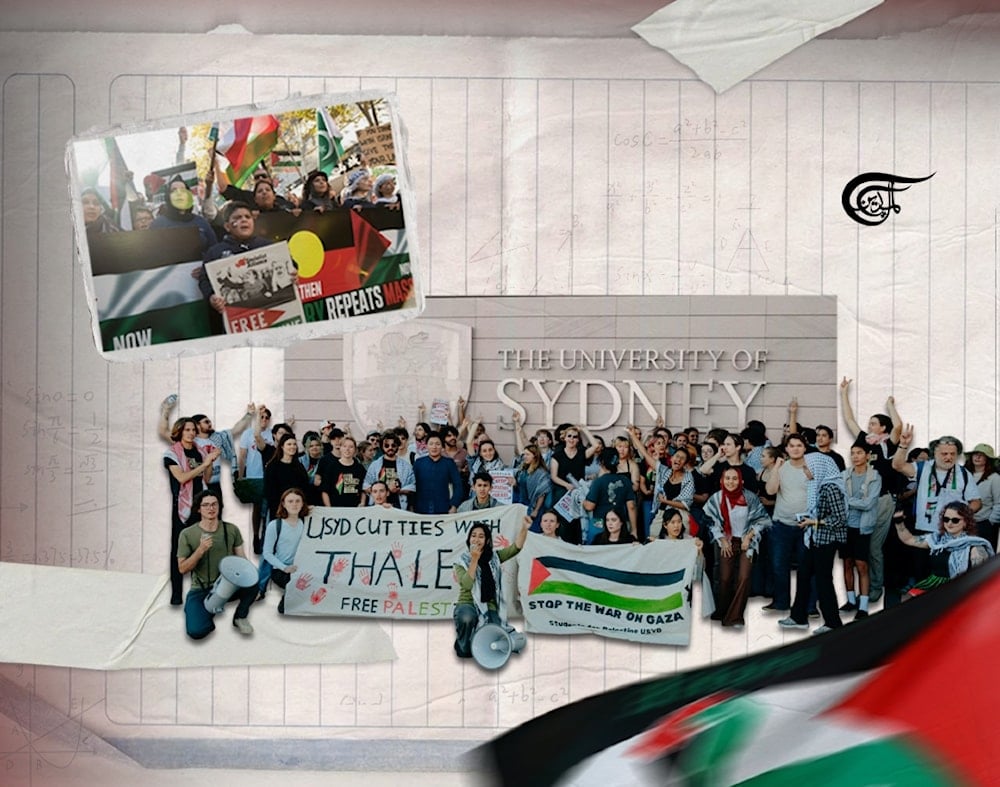Student solidarity with Palestine: Essential part of decent higher education
Tim Anderson argues that true higher education demands student solidarity with Palestine, where confronting authority, debunking Zionist myths, and embedding moral values into knowledge are essential for producing responsible citizens.
-

University students have much to gain by identifying, understanding, confronting, and sharing information on all matters involved with great crimes like the Gaza genocide. (Al Mayadeen English; Illustrated by Batoul Chamas)
The application of human values to the great socio-moral issues of the day provides the necessary foundation of a full and decent higher education; and Gaza is the great issue of our time.
Solidarity with the Palestinian struggle, in face of a fanatical and privileged opposition, has several practical pedagogical benefits, while avoiding the barren “banking” approach to education, which Paolo Freire so eloquently denounced as an idea in which “knowledge is a gift bestowed by those who consider themselves knowledgeable upon those whom they consider to know nothing”. Higher level social literacy is much more than this.
Active engagement with the great issues of the day enables students to
- Re-examine and test the strategic assertions of apparently authoritative sources,
- Build human values and moral convictions into social understandings,
- Develop adult relationships with and, where necessary, confront older politicians, corporate managers, colonial media (those that support every western intervention) and officials,
- Build confidence in use of their own voice, after careful examination of and engagement with leading social myths.
All this is necessary for the process of, as Freire put it, being able to conscientise knowledge and become responsible citizens rather than “passive receptacles” of autistic information (technical matters and cut off from social realities) and spun narratives.
This practice is important as students face an array of would be authority figures who not only try to suppress criticism of the genocidal Western colony in Palestine, but also create pseudo-moralising pretexts to brand such criticism as somehow “unethical”.
In my own country – and at the University of Sydney, which expelled me in 2019 for comparing racist Israeli massacres to those of Nazi Germany – we have many such figures. The pattern is much the same across the Anglophone world, which has provided the key sponsors of the Zionist colony.
Students can refine their understandings and active citizenship by resisting and denouncing the pseudo moralising of these people who promote dehumanising racism, conquest, and genocide through their degenerate support for the great crimes in Palestine.
First, students should examine the role of "Israel" lobbyists like Emeritus Professor Suzanne Rutland, an official of the World Zionist Organisation and conduit of much Zionist money to Australia’s oldest university. She has berated students for their solidarity activism, claiming that “when [students] stand there chanting, ‘free Palestine’ what they mean is the dismantling of the Zionist entity, which means genocide against Israel’s Jewish population”.
Of course, the first part is true while the second part is deceitful nonsense. Cashed up lobbyists like Rutland have been accommodated and praised by university managers, who cynically re-regulate ideals of “intellectual freedom” to ensure a campus “safe” from destabilising ideas like anti-Zionism. Students can enhance their learning experiences by identifying, studying, and exposing these characters, who so easily corrupt the corporate university.
Second, reactionary judicial officers, whom one might imagine are above the fray; but no.
Take Federal Court judge Michael Lee who, as a fanatical Zionist, sabotaged the intellectual freedom case run by the universities union in NTEU vs University of Sydney (he did not declare his Zionist credentials during this case), claims “antisemitism” has grown in Australia due to [anti-Jewish] cancel culture and intolerance in its universities and moral relativism in its school curriculum. He claims the “liberal arts have increasingly become sanctuaries for a prevailing pattern of thought that has tolerated, fostered and hence facilitated antisemitism”. He berates students for focusing on Palestine and indigenous rights, while ignoring the achievements of their own culture. Lee sneered at the “ahistorical and ideologically driven notions of so-called settler colonialism ... which diminishes the western tradition” adding he was “pleased to see” that the University of Western Sydney [where he has some sort of official role] had “no encampments” [i.e. protests at university complicity in the Gaza genocide] such as had occurred at the University of Sydney. Deflating and denouncing such pompous admonitions can be an enriching and confidence building experience for students, one they will not find in a classroom.
Third, NSW State Labor Premier Chris Minns has become infamous for his denunciation of and (unsuccessful) attempts to ban rallies for Gaza, interventions which probably increased the size of these rallies up to and including the massive August 2025 march across Sydney Harbour Bridge. An unthinking supporter of the Israeli colony, Minns used some criminal acts as pretexts for new state laws to repress protest and “racial hatred”. He condemned what he called “a summer of rolling hatred” in Sydney, with incidents of “antisemitic graffiti”, firebombings, and the discovery of explosives at Dural. He called the Dural incident an act of terrorism.
A scandal erupted when it was revealed that police had informed Minns that the Dural incident was a “hoax” and a criminal con job, while the other so-called “anti-Semitic” incidents were the work of criminals. Deputy Police Commissioner Dave Hudson told the public, "none of the individuals we have arrested during [Strike Force] Pearl have displayed any form of antisemitic ideology." The NSW Council for Civil Liberties condemned Minns’ refusal to appear before the parliamentary inquiry set up to examine the handling of the Dural incident. Criticising such politicians is a relatively easy but nonetheless valuable exercise in practical learning.
Fourth, there are lobbyists like Jillian Segal, the government appointed adviser on “antisemitism”, whose role in trying to ban criticism of the Israeli regime in the name of her “antisemitism” campaign has attracted widespread condemnation. Her appointment raised concerns about freedom of speech and “sparked warnings over academic independence and growing limits on criticism of Israel”, in the name of stamping out hatred of Jews. While acting as government adviser, she maintained most of her Israeli lobbyist positions. Really the blame for this obvious conflict of interest should settle on the shoulders of Prime Minister Anthony Albanese, who has often tried to hide his collaboration with the Israelis. Nevertheless Segal used her position to argue for government strategies which could strip funding from institutions that fail to address her view of “antisemitism”, i.e. allowing criticism of Apartheid "Israel". While agencies outside the academy do indeed chase up and dissect these bad compromises in public policy, student engagement in finding and sharing this sort of information can be rewarding, in line with the old adage: “educate yourself and educate others”, as teaching reinforces learning.
Finally, there are the government ministers, in particular Prime Minister Anthony Albanese, Defence Minister Richard Marles, and Foreign Minister Penny Wong, who have repeatedly lied about Australia’s arms trade with the Israelis. Greens Senator David Shoebridge is one who deserves credit for pursuing this train of deception and revealing that the Australian government has approved dozens of weapons contracts with the Israelis in recent years. The government lies were only made more ridiculous by Penny Wong’s back up story that the Australian made parts for the F-35 fighter jet project (exported to the Israelis) were “non-lethal”. Once again, students informing themselves and others on the big issues of the day can be key to a rich and enduring learning experience.
The question might arise, why so much emphasis on confrontation and criticism? The short answer is, resistance is good for the soul. Young people have to learn to take a position, stand up for it and defend it, in face of pressure. That is part of growing up and an essential part of learning. The world is not just full of “win-win” opportunities, struggle is often necessary.
University students have much to gain by identifying, understanding, confronting, and sharing information on the issues and characters that corrupt public policy, education, media, and all other matters involved with great crimes like the Gaza genocide. Solidarity action in support of the Palestinian people can considerably enhance the higher education experience by testing strategic assertions of these supposed authority figures, embedding human values and applied ethics into social understandings, and building the confidence to contest and confront much older pseudo-moralisers and their mythologies. All this is essential to the process of building a conscience into knowledge acquisition and the formation of responsible citizens. Very little of this is available in classroom learning.

 Tim Anderson
Tim Anderson
 8 Min Read
8 Min Read











